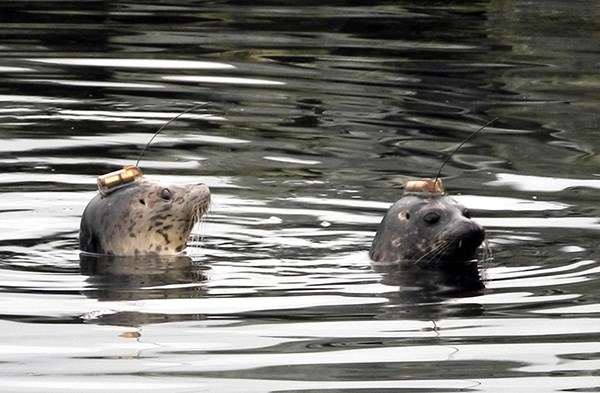When the back doors of the Vancouver Aquarium van opened and a wall of salty stale fish odour wafted out, there was no doubt of what was about to happen at Porteau Provincial Park.
Vancouver Aquarium Marine Rescue Centre veterinarians brought five harbour seals to the marine park on Thursday, Nov. 20 for release back into the wild after the seals were nursed to health by rescue centre staff.
Two seals were equipped with satellite-linked transmitters attached to their heads using animal-safe glue..
“Tracking them helps us understand the factors that affect the survival of rescued, rehabilitated and released animals,” said Dr. Martin Haulena, the head veterinarian at the aquarium.
Porteau was chosen as the release point because Howe Sound is ideal harbour seal habitat, Haulena said.
The seals were brought to the edge of the water at the provincial park boat ramp and the doors of their cages were opened. Two of the young seals went straight to the water while the other three lingered in their carriers.
Haulena said that is common because the seals become very accustomed to being around people.
Two seals had to be coaxed out as aquarium staff resorted to tipping the carriers on steep angles, causing the animals to reluctantly slide out.
According to Haulena, released seals can stray hundreds and even thousands of kilometres from the point of release.
The five released seals all stayed close to the shore for at least half an hour after they were set free, popping up every few minutes to look around at their new surroundings. Haulena said the seals would eventually move on and explore their new freedom.
The seals, named Scandium, Palladium, Neptunium, Ruthenium and Tellurium after elements on the periodic table, are a few of the more than 160 seals that have come through the aquarium’s rehabilitation program this year. The five females arrived at the centre as young pups this summer and are now three to four months old.
Seals that are rescued and arrive at the centre come from all over the province and are usually abandoned or injured. They spend a few months recovering and then are ready to go back into the ocean.
Veterinarians and researchers at the aquarium outfitted some of the seals with transmitters to glean information about their behaviour and learn about the effectiveness of the rehabilitation program.
“We’re trying to release about five animals a year with satellite link transmitters. It’s very expensive technology, but very, very informative,” said Haulena.
The transmitters are glued on the seals and usually within two or three months they fall off because of the animals’ movement.
Basic satellite transmitters cost $2,500 in addition to the cost of satellite usage – about $250 per month.
The seals released at Porteau Cove were expected to travel up to 1,000 km over the first few days to find a place for themselves.
“I’m glad we follow up on animals to the best of our knowledge. We do a good thing here,” said Haulena.
The seals’ travels can be tracked on the aquarium website at www.vanaqua.org/act/direct-action/marine-mammal-rescue/tracking.




